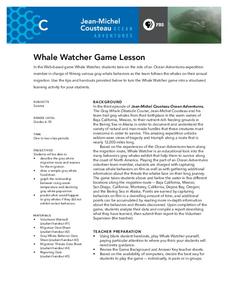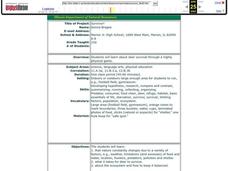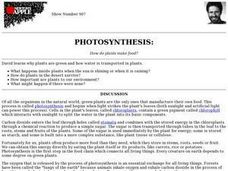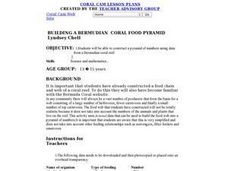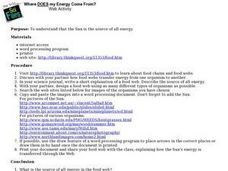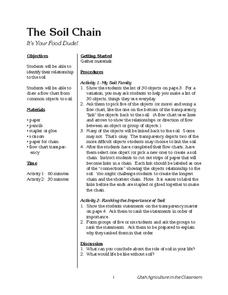Curated OER
The Food Web
Students explore the role that the Arctic hare plays in the Canadian Arctic food web.
Curated OER
Lower the Trans and Increase the Omega-3s
Students identify the health risks associated with trans fats. In this adult health lesson, students examine food labels for hydrogenated oils content. They discuss the benefits and sources of omega-3s.
Curated OER
Our Choices Matter: What You Eat
Students will record their food choices for one week, noting calories, protein and vitamin content of foods using a given USDA website. Students will discuss whole class the important of proper nutrition and its role, and what happens...
Curated OER
Have You Ever Seen a Sea Monkey?
Fourth graders observe brine shrimp over several days. They create drawings showing the growth and development of the shrimp. They research web sites to find out where brine shrimp fit on the food chain and what makes the shrimp unique.
Curated OER
Sea Connections: Marine Ecosystems
Students identify producers and consumers from marine ecosystems and describe the balance among them in the environments. After constructing a food chain from a marine ecosystem, they examine human activities that can upset the balance...
Curated OER
Whale Watcher Game Lesson
Students study the gray whale migration and compare their populations to the increasing ocean temperature. In this whale watcher lesson students draw a food chain.
Curated OER
Survivor!
Students play a game in physical education class to examine how a deer survives. Using nature as a guide, they discover how it is constantly changing due to weather, food, water, pollution and predators. They discuss the characteristics...
Curated OER
Pyramid of Biomass
Students interpret data to demonstrate biomass and number pyramids. They use information to draw conclusions and examine an example of biological magnification.
Curated OER
Energy Flow - How Much Biomass do Plants Produce?
Young scholars explore the concept of biomass. In this plant lesson, students conduct a scientific investigation that requires them to observe plant growth and biomass.
Science Matters
That’s An Otter Story
Young scientists discover how sea otters' habitats have changed due to human impact. Through conversation, video observation, and story reading, scholars identify how human interactions change a specific ecosystem in both positive and...
Curated OER
Photosynthesis: How do plants make food?
Students study why plants are green and how water is transported in them. They examine how plants respond to different amounts of light.
Curated OER
Science: Coral Reef Food Pyramid
Pupils construct numbers pyramids using fictional data from a coral reef. they tally the numbers of carnivores, herbivores, and producers. Students next build a pyramid shape in which they put their numbers of producers, herbivores,...
Curated OER
Who's Hungry?
Students research the importance of a healthy diet and the world's nutrition. In this health and diet lesson, students discuss the foods animals and people eat. Students discuss the food chain and create a food chain. Students create a...
Curated OER
"From farm to plate"
Learners identify sources of food and the bacteria associated with them. They comprehend how bacteria in the food chain can cause disease. Students comprehend the importance of proper food-hygiene practices throughout the many stages of...
Curated OER
Where Does My Energy Come From?
Students gain an understanding that the Sun is the source of all energy. With a partner, they examine various web sites to explore food chains and food webs, later sharing their findings with the class.
Curated OER
Identifying trophic levels and the skeletal system through Owl Pellets
Students identify a food chain sequence. They compare, identify, and record the rodent skeletal parts to a rodent skeletal diagram. Students construct a rodent skeleton from the skeletal parts found in the pellet. They are given the...
Curated OER
Introduction to Worm Bin Project
Learners observe the decomposing process of the food chain in a worm bin. They observe whether the type of food fed to worms affect the castings given off during the decomposition process. They learn and practice graphing their findings.
Curated OER
Who Eats Whom in the Salt Marsh?
Seventh graders complete a virtual online salt marsh tour. In groups, they observe and identify the various types of animals found in the marsh. After categorizing the animals, they create a food web based on the animals role in the...
Curated OER
Giants of the Animal Kingdom
Fourth graders examine the megafauna found in Australia. They create a food web using cut-outs and develop a timeline to show changes in the fauna over time. They draw their own megafauna scene for their classroom.
Curated OER
Pond Water Web
Students familiarize themselves with the common organisms that live in a pond and discover their importance in a balanced aquatic habitat as they create food webs. They also investigate how an environmental change affects the habitat as...
Curated OER
Cycles of Life in an Urban Habitat: Changes in Biodiversity
Second graders compare and contrast animate and inanimate objects. In this environmental science lesson, 2nd graders create simple food webs. They observe their environment and create a collage about it.
Curated OER
March Market
Students role play a living wetland food web. They trace the food web associated with the items in their lunch.
Curated OER
Who Can Harvest A Walleye?
Seventh graders investigate the concept of how an ecosystem is put together while conducting research using a variety of resources. They correctly differentiate between a herbivore and carnivore by placing them in the order of hierarchy...
Curated OER
The Soil Chain
Students identify their relationship to the soil. In this soil lesson plan, students draw a flow chart to show how common objects relate back to the soil. Students also discuss the importance of the soil.
Other popular searches
- Deciduous Forest Food Chains
- Food Chains in Biomes
- Food Chains Food Webs
- Food Chains and Webs
- Food Chains Decomposers
- Food Chains and Food Webs
- Animal Food Chains
- Ocean Food Chains
- Meadow Food Chains
- Food Chains, Food Webs
- Guided Discovery Food Chains
- Food Chains Webs





